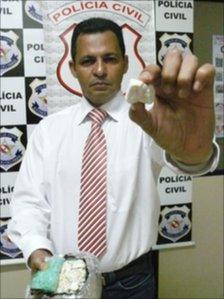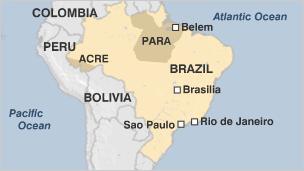Brazil sees spread of Amazon 'crack cocaine' oxi
- Published
Luiz Veiga: Oxi completely destroys the users' bodies
In the dark alleys of cities in the Brazilian Amazon, the smell of burned plastic and fuel is in the air, coming from small groups of people smoking under the cover of night.
They are users of oxi - a dirtier and more devastating version of crack cocaine.
The drug has taken hold in towns and cities in the Amazon thanks to its low price - about $1 (60p) a hit - and extreme addictiveness.
"Life on the streets is hard. I have to find money every day to get drugs or I can't sleep," said an oxi user between one hit and the next.
"[If I don't use the drug] I feel strung out. When I see the 'stone' [piece of drug] ending, I immediately start to wonder how I will get some more."
Oxi, short for oxidado or rust, has been known to users and authorities in the Amazon for almost two decades - but during the past few years the police have noticed a significant rise in its use.
"Oxi accounts for about 80% of the drugs we seize here in the state of Para. Oxi has replaced crack as the most 'fashionable drug' in our region," says Ivanildo Santos, head of the organised crime unit in Para's police force.
However, oxi has only received national attention during the past couple of months as police have begun to find it in the richer and more populous cities further south, like Sao Paulo and Rio de Janeiro.
Spreading
Researchers also say that even though oxi remains a drug of choice for the poor and homeless, it is making its way into the middle and upper classes.
"We really consider this as an epidemic because since oxi is cheaper and more powerful than crack cocaine, it tends to replace it in the poor suburbs," says Mr Santos.

Police say they are seeing more oxi on the streets
Oxi is made from the leftovers of cocaine production, mixed with quicklime, paraffin or petrol.
"A couple of weeks ago I seized a load of over 20kg [44lb] here in Belem," says police commissioner Eder Mauro.
"Oxi has increased violence in our city. And furthermore, I take this issue personally very seriously because I have lost one brother to drug abuse."
In the Centro Nova Vida, a centre helping users to kick the habit, stories of lives and families destroyed by oxi abound.
The centre's president, Luiz Veiga, says most of the 30 residents currently in treatment were oxi users.
"It's a horrible drug. Those chemicals are extremely harmful to all organs, beginning with the liver," he says.
"The users also have serious mental issues, like delirium and persecution paranoia."
Mr Veiga himself was a drug addict for 28 years - he lost his real-estate business and was homeless for more than a decade before a former employee of his company "rescued" him from the streets.
He has been clean for the past 21 years.
"The streets are even worse nowadays than they were in my time. There's more violence and new, more harmful drugs, like this oxi," he says.
Drawn into crime
In Mr Veiga's rehab community, all patients are there voluntarily and most do not pay for treatment.
They are trying to come to terms with their past and therefore usually willing to tell their stories, with gruesome details.

"I was a police officer but I was removed from duties because my superiors thought I was crazy. But it was all drug use," said a man in his late 30s, who like most of the former users, did not want to be named.
He said he had sold everything he had had and started dealing drugs to pay his addiction.
"I lost my family. My wife left me, my children went away and only the drug dealers were interested in me."
It did not take long for this former police officer to fully dive into crime.
"I was robbing and working as hit man for the drug dealers, killing their rivals," he said.
He has been clean for two months in rehab and hopes to build a new life once he is out.
"I hope my family will take me back, but I can't be sure. I harmed them too much."
A 17-year-old student who began taking oxi and other drugs at the age of 12 has a similarly harrowing story.
"Oxi was the strongest drug I tried, much worse than crack. It hooked me up real quick and soon I was doing whatever it took to get it."
In spite of his young age, he has already spent two years in a youth corrections facility for robbery.
The sentence could have been much longer - if the courts had known he had been guilty of murder too.
"I had enormous debts with a dealer so he ordered me to kill one of his rivals or I would get killed myself", he said.
"I went to the street where the target lived and started shooting. I killed at least two people, but maybe more."
The teenager - who has recently finished the four-months rehab programme - is now back at school, hoping for a fresh start.
"I can't even begin to tell you how much I regret the way I have wasted my life with drugs. It really saddens me to see that oxi is now spreading to the whole country."
- Published30 March 2011
- Published17 November 2010